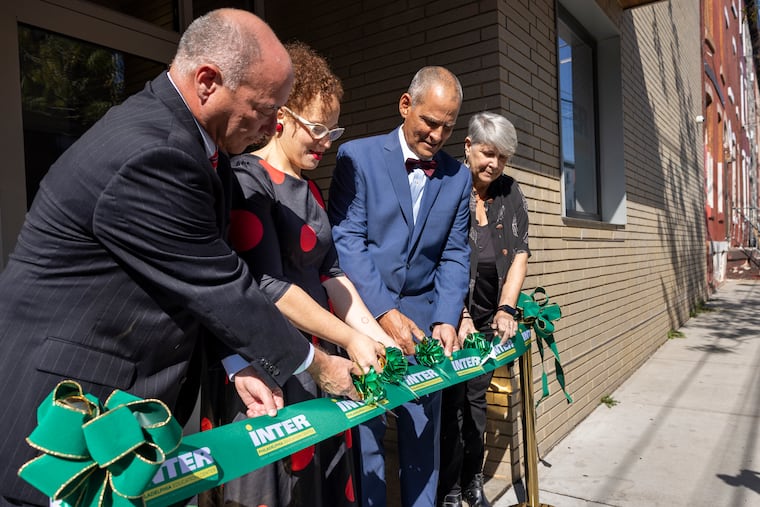Universidad Interamericana de Puerto Rico to open Philadelphia campus
The university will expand to Philadelphia when their Fairhill campus opens in January

With a snip of his golden scissors, Rafael Ramírez Rivera, acting president of the Universidad Interamericana de Puerto Rico (or Inter American University of Puerto Rico in English), cut the ribbon on his university’s newest addition: the Inter Philadelphia Education Center (IPEC) on North Fifth Street in Fairhill.
Rivera brought his university over 1,700 miles, located it in the lowest-income neighborhood in Philadelphia, and entered one of the country’s most competitive higher education markets.
There are over 61 colleges, universities, and technical schools in the Philadelphia area, including Drexel University, Temple University, and Community College of Philadelphia. Rivera said IPEC offers a unique product at the right time — bilingual higher education for the state’s growing Latino communities and that gives them an advantage over other local institutions.
“The key limiting factor that Latinos have is with English proficiency. We have bilingual delivery,” Rivera said.
State Rep. Danilo Burgos, who attended the inaugural ceremony, agreed. “They don’t cater to Spanish-speaking students, although they have made huge improvements. [IPEC’s staff] understands the native towns, understands the people and that is a huge advantage.”
» READ MORE: Here are fall 2022 enrollment numbers for Philly-area colleges and universities
IPEC is housed at Taller Puertorriqueño and the ceremony marked the end of a six-year effort between the arts center and the university to bring its Northeast campus to the city. Taller opened its new 24,000-foot facility in 2016 with the goal of offering space to partnering organizations to complement its arts and cultural programming.
“We were close to opening (IPEC) in 2017,” recalled Taller’s retired Executive Director Carmen Febo, “and then María hit. And then the earthquake. And then COVID. I was afraid that [the university] might lose interest, but they stayed true to their commitment.”
Febo added that the Philadelphia campus is important to the university’s own expansion plans. “There are four to five million Puerto Ricans on the mainland and three million Puerto Ricans on the island. They are expanding their footprint onto the mainland.”
Founded in 1912, Universidad Interamericana de Puerto Rico is a private, nonprofit institution that was started by the Rev. John Will Harris, a Texan missionary. It was accredited by the Middle States Association of College and Secondary schools in 1944, making it the first school to receive the accreditation outside the continental U.S. Currently, the university has three expansion sites — Philadelphia; Orlando, Fla; and one in Panama.
Although Universidad Interamericana offers 300 programs, the IPEC will first focus on education starting with a bachelor of arts degree in the early childhood education preschool level. The ultimate goal is to develop a pipeline of bilingual teachers, especially at the pre-K to fourth grade level to help improve the academic progress of Spanish-speaking students.
“The need to train professionals who can meet the Philadelphia Department of Education’s teacher certification requirement was the driving force behind the development of this initiative,” explained Rivera.
Febo said the university originally wanted to locate its third expansion site in New York. However, she was able to convince the former president to reconsider Philadelphia, which she said is geographically central to the largest concentrations of mainland Puerto Ricans — including Baltimore, Washington, and New York.
Because of the focus on education, the Philadelphia campus fell under the leadership of the university’s Arecibo campus, one of nine campuses it has across the island and where Rivera was chancellor.
A university in the heart of Fairhill would be both an academic and an economic driver creating jobs in the neighborhood. “We believe that for our community to go out of poverty, we need a holistic system. For a community that is underserved, you need a continuity of support to create wealth and economic power,” said Nasheli Ortiz González, Taller’s current executive director.
Taller and the university are collaborating to recruit its first class of 25 students to start in January. Despite a downturn in enrollment that has plagued other colleges trying to return to their pre-pandemic enrollment levels, Rivera is optimistic. One reason is the school’s affordability — only $300 per credit.
As befitting a university that has deeply embedded Christian roots, the Rev. Norberto Domínguez Rodríguez, vice president for religious affairs, ended the ceremony with a dedication prayer. “Bendice a los futuros estudiantes y sus deseos de aprender …”
Please bless all our future students and their eagerness to learn.